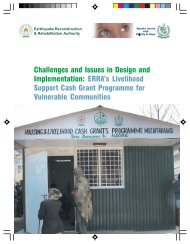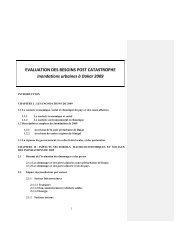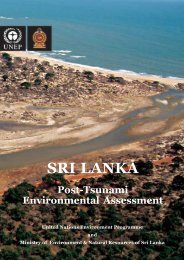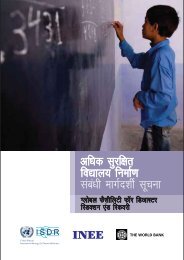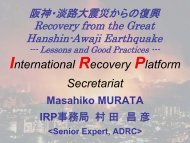Aceh Emergency Response and Transitional Recovery ... - UNDP
Aceh Emergency Response and Transitional Recovery ... - UNDP
Aceh Emergency Response and Transitional Recovery ... - UNDP
You also want an ePaper? Increase the reach of your titles
YUMPU automatically turns print PDFs into web optimized ePapers that Google loves.
• <strong>UNDP</strong>'s Office of Audit <strong>and</strong> Performance Review (OAPR) has undertaken<br />
a risk assessment for tsunami-related programming in Indonesia<br />
which has provided recommendations on measures for risk mitigation,<br />
anti-corruption, procurement <strong>and</strong> other legal <strong>and</strong> political risks.<br />
• <strong>UNDP</strong> Office of Legal <strong>and</strong> Procurement Services (OLPS) has made<br />
available to <strong>UNDP</strong> country offices undertaking tsunami-related procurement<br />
support in the form of roving procurement officers who are reviewing<br />
procurement processes to ensure <strong>and</strong> enhance efficacy <strong>and</strong> transparency.<br />
<strong>UNDP</strong> has had a Roving Procurement Officers posted in the country<br />
office since February.<br />
Monitoring<br />
An overall monitoring framework for the <strong>Aceh</strong> <strong>Emergency</strong> <strong>Response</strong> <strong>and</strong> <strong>Transitional</strong><br />
<strong>Recovery</strong> Programme has been established to achieve the following purposes.<br />
• Results-Orientation: Ensure appropriate measurement <strong>and</strong> assessment of<br />
programme performance in order to more effectively improve performance<br />
<strong>and</strong> achieve results.<br />
• Quality Assurance: Ensure quality in project activities supported through<br />
ERTR to ensure best possible benefit for beneficiaries, through monitoring<br />
programme delivery <strong>and</strong> identifying issues that need corrective action <strong>and</strong><br />
ensure that additional assistance is provided early.<br />
• Accountability: Ensure accountability in the use of programme resources<br />
through heavy emphasis on financial reviews to make sure that funds are<br />
being appropriately used to achieve project outputs, <strong>and</strong> that the implementing<br />
agents have sufficient controls in place to demonstrate that funds<br />
are being used appropriately.<br />
• Transparency: Ensure transparency in programme activities, finances,<br />
<strong>and</strong> results to all stakeholders.<br />
• Learning: Ensure that the programme has mechanisms to ensure learning<br />
for purposes of improving ongoing implementation <strong>and</strong> guiding new initiatives,<br />
<strong>and</strong> to identify key lessons learned <strong>and</strong> successes stories from programme<br />
implementation in relation to post-crisis recovery to feedback into<br />
planning <strong>and</strong> implementation processes of <strong>UNDP</strong>, the Government <strong>and</strong><br />
development partners;<br />
The monitoring system includes on-site field monitoring, structured reporting by<br />
partners <strong>and</strong> validation of this reporting by <strong>UNDP</strong>, financial monitoring of partner's<br />
expenditures, <strong>and</strong> expenditure tracking. Feedback is provided to implementing<br />
partners <strong>and</strong> contractors in order to identify issues that need corrective action,<br />
ensure that such actions are taken early, <strong>and</strong> to improve overall quality in the implementation<br />
of activities <strong>and</strong> provision of services.<br />
36


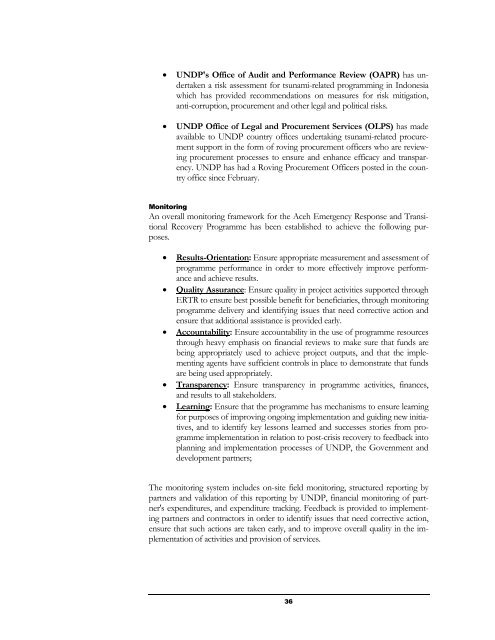

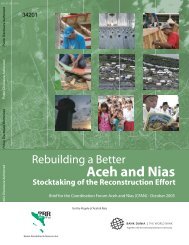
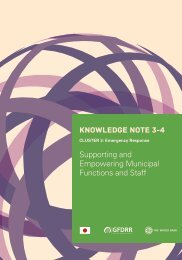
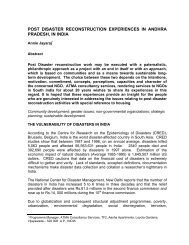
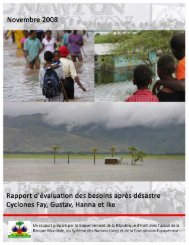
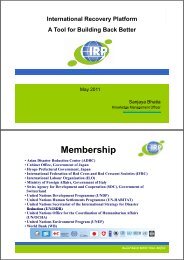
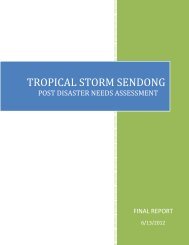
![View full document [PDF 7.65 MB] - unisdr](https://img.yumpu.com/48902806/1/178x260/view-full-document-pdf-765-mb-unisdr.jpg?quality=85)
